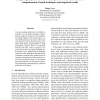Free Online Productivity Tools
i2Speak
i2Symbol
i2OCR
iTex2Img
iWeb2Print
iWeb2Shot
i2Type
iPdf2Split
iPdf2Merge
i2Bopomofo
i2Arabic
i2Style
i2Image
i2PDF
iLatex2Rtf
Sci2ools
ACL
2011
2011
Integrating surprisal and uncertain-input models in online sentence comprehension: formal techniques and empirical results
A system making optimal use of available information in incremental language comprehension might be expected to use linguistic knowledge together with current input to revise beliefs about previous input. Under some circumstances, such an error-correction capability might induce comprehenders to adopt grammatical analyses that are inconsistent with the true input. Here we present a formal model of how such input-unfaithful garden paths may be adopted and the difficulty incurred by their subsequent disconfirmation, combining a rational noisy-channel model of syntactic comprehension under uncertain input with the surprisal theory of incremental processing difficulty. We also present a behavioral experiment confirming the key empirical predictions of the theory.
ACL 2011 | Computational Linguistics | Empirical Predictions | Language Comprehension | Noisy Channel |
| Added | 23 Aug 2011 |
| Updated | 23 Aug 2011 |
| Type | Journal |
| Year | 2011 |
| Where | ACL |
| Authors | Roger Levy |
Comments (0)

